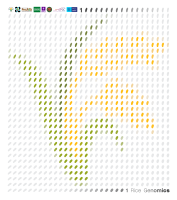The joint initiative stands to deliver a huge amount of data from the genome sequences of the 1001 Philippine TRVs. This will be made available to the public via the PH Rice GDB. From strengthening local expertise in crop genomics and bioinformatics, to providing more research opportunities—the program anticipates its potential in increasing and strengthening research output and capacity. The 1001 Rice Genome (1k1RG) Program is a promise to the future of rice in the Philippines as it ultimately aims to benefit farmers through accelerating the improvement and production of rice varieties.
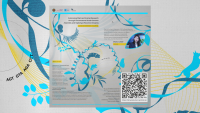
Webinar: Advancing Plant and Animal Research through Chromosomal Scale Genome Assembly and Haplotype Resolved Analysis
The DNA Sequencing Core Facility (DSCF) partnered with Dovetail Genomics to host a webinar featuring resource speaker Dr. Chui Li on July 3, 2024, 1:00 PM – 2:00 PM. Learn more about this talk below: Importance of Chromosomal Scale Genome Assembly Achieving chromosomal-scale genome assembly is essential for unlocking the full potential of plant and animal […]

PGC poster presentations at the USJCMSP’s 24th EID Conference in Incheon, Korea
PGC researchers were invited to present their selected abstracts for a poster presentation during the United States-Japan Cooperative Medical Sciences Program (USJCMSP) 2024 International Conference on Emerging Infectious Diseases (EID).

DSCF trains UP Cebu researchers in Shotgun Metagenomics Sequencing
A Shotgun Metagenomics Sequencing training was conducted by the DNA Sequencing Core Facility (DSCF) on March 4-8, 2024 for University of the Philippines Cebu researchers. The trainees from UP Cebu were composed of researchers from Project REHAB (River Ecosystem Health Assessment using Biomonitoring Tools) under the DETOXS Program (Detection, Treatment, and Detoxification System for Emerging […]

DSCF conducts WGS training for VVIP
The DNA Sequencing Core Facility (DSCF) conducted a Whole Genome Sequencing (WGS) training for Virology and Vaccine Institute Philippines (VVIP) researchers on February 20-22, 204 under their project “Detection of Food and Waterborne Bacterial Pathogens using Phage-based Diagnostics”.
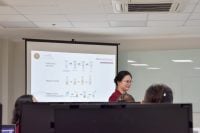
DSCF trains Visayas State University researchers in 16S Metagenomics Sequencing
The DNA Sequencing Core Facility (DSCF) conducted a 16S Metagenomics training for Visayas State University (VSU) attendees on September 18-22, 2023.
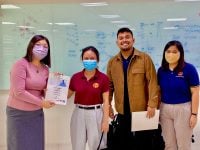
AMR-HYB training for DSCF
A training on AMR-HYB for the DNA Sequencing Core Facility (DSCF) with Golden Bat and QIAGEN was conducted on April 17-19, 2023.
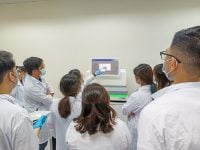
DSCF conducts whole genome sequencing training for the Bureau of Animal Industry
From March 20 to 22, 2023, the DNA Sequencing Core Facility (DSCF) hosted an instructive training session on Whole Genome Sequencing (WGS) tailored for the Bureau of Animal Industry (BAI). The participants were immersed in a comprehensive lecture on Molecular Biology Techniques for Genomics, gaining insights into the intricacies of Next Generation Sequencing (NGS) and […]

FREE AMR sample sequencing by PGC DNA Sequencing
The DNA Sequencing Core Facility (DSCF) in partnership with Golden Bat and QIAGEN is conducting a FREE sequencing of AMR samples from April 17-19, 2023.
Interested participants shall write a one-page rationale on why they need their sample/s sequenced and send it to dnasequencing@pgc.up.edu.ph with the subject: AMR Sequencing [Entry]_Affiliation_Name
Deadline for entries is on March 31, 2023. For more information, contact Ma. Celeste S. Abad at msabad@up.edu.ph or dnasequencing@pgc.up.edu.ph and/or call 981-8500 loc. 4707
Details on how to send accepted samples will follow.
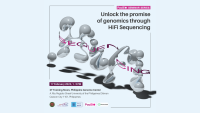
Unlock the promise of genomics through HiFi sequencing
The DNA Sequencing Core Facility together with Noveaulab will be hosting a seminar on February 17, 2023, “PacBio Seminar: Unlock the promise of genomics through HiFi sequencing”
Date: Tuesday, February 17, 2023
Time: 1:00 PM Philippine Standard Time
Type: Onsite
Dr. Zuwei Qian, PacBio Director of Marketing for the APAC region will be the presenting the following topics:
HiFi reads: a new era for metagenome analysis
The long and short of it: PacBio sequencing for precision medicine

